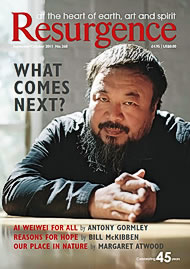A few years ago, in this magazine, I had the opportunity to review Lewis Hyde’s then newly published book Trickster Makes This World. There’s a sense of completion, it would seem, in being able to return to his latest title, Common as Air.
Early in the book the author lays out the driving issue: he asks, “In what sense can someone own, and therefore control other people’s access to, a work of fiction or a public speech or the ideas behind a drug?” From here, he goes on to energetically explore art, science (particularly research into the human genome), agriculture and a British history of the commons and folk culture. Indeed, when was the last time you read a book whose reference points spanned from John Locke to the Clancy Brothers? He also offers us all sorts of interesting details of history and language.
In the book’s first chapter, Defending the Cultural Commons, he briefly names the concerns that the book will explore, how “we are presently witnessing a second enclosure, a capture of cultural rather than agricultural commons”.
Hyde’s central thesis is that America’s Founding Fathers were motivated by a strong sense of the value in sharing knowledge as part of their imperfect democratic ideal. He writes of Franklin, Madison and their compatriots: “I find in them a useable past, especially in that they suggest a number of ways to widen the terms of engagement beyond the ‘theft is theft’ approach whose seed is now being so widely sown.”
Common as Air becomes a book about the spiritual, about the sense of our deeper selves. As in his previous books, Hyde’s prose demonstrates a flair for pithy, thoughtful observation. Hence we find the text peppered with comments like “What happened in the nineteenth century to tangible properties is happening now to intangibles.”
The overall ambition of the book, then, is to explore how best we can be the custodians and conduits of a concept and its potential manifestations. For Hyde, trying to work out how to be such a custodian is helped greatly by considering how the roots of modern American life are key to the idea of ‘common knowledge’. “In a democracy,” he writes, “intellectual property is ultimately a republican state.”
It may be obvious to say that this democratisation of knowledge is an ongoing project, and certainly the book ultimately resounds a hopeful note for how we might counter what appears to be an increasing, all-embracing tendency towards ownership of knowledge.
You may know Hyde’s books Trickster Makes This World and The Gift as stimulating, humanist works that unpack social, cultural, political and even epochal concerns. The author makes them buzz with relevance, shooting them through the lens of case studies about the accomplishments of individuals’ thought and action. It’s at that point in their respective narratives that these two previous titles were most fascinating, and Hyde repeats the approach this third time around.
What we have with Common as Air then is, I’d suggest, the third part of a trilogy (each about maverick thought and action in the best way), and throughout my reading of it I often made a mental leap back to the previous works. Certainly Hyde’s writing is good for the synapses. With The Gift, he explored just that: what it is to give of your time, your understanding, your creativity, yourself. With Trickster Makes This World he explored the work of people somehow operating on the edge of the mainstream and thereby able to subvert the status quo and effect change.
The great accomplishment of Common as Air is to take what we might consider an abstract, aloof concept (ownership and access to information) and fashion it into something on a recognisable human scale, moving from the world without to our world within.
This book should unsettle and provoke. But it’s also a book to be somewhat guided and inspired by, encouraging us to embark on a creative endeavour. This is a book that finds the joy in rethinking and reconfiguring how and why we should share what we know. Just because you light a candle doesn’t mean the other one is extinguished.






